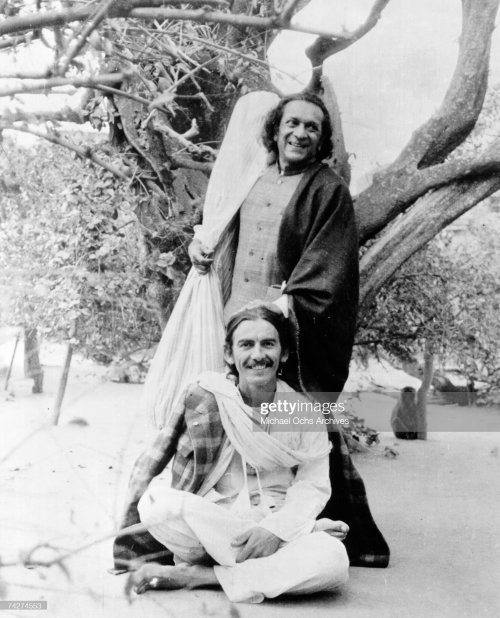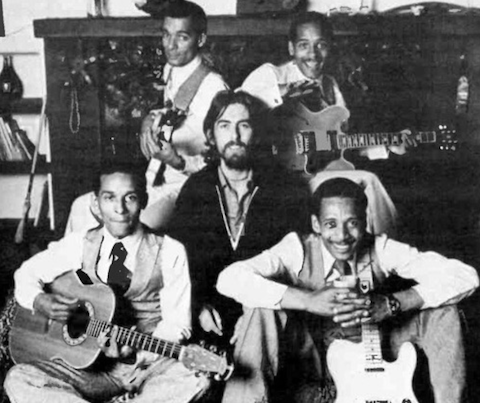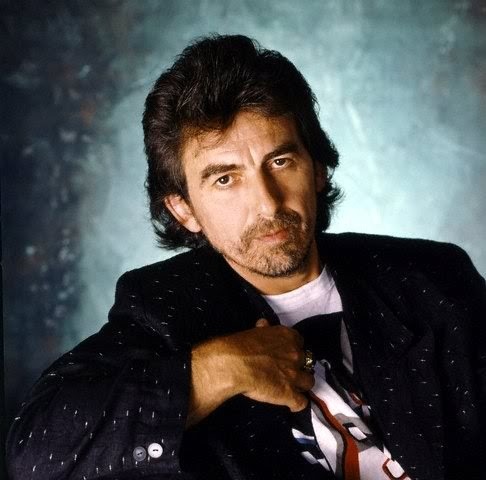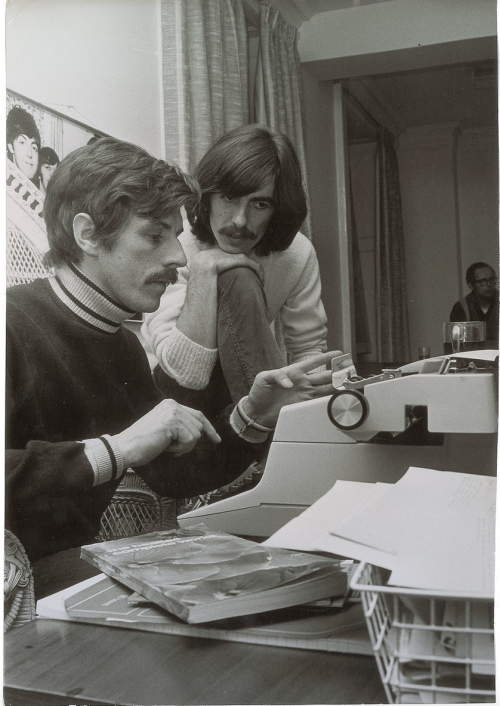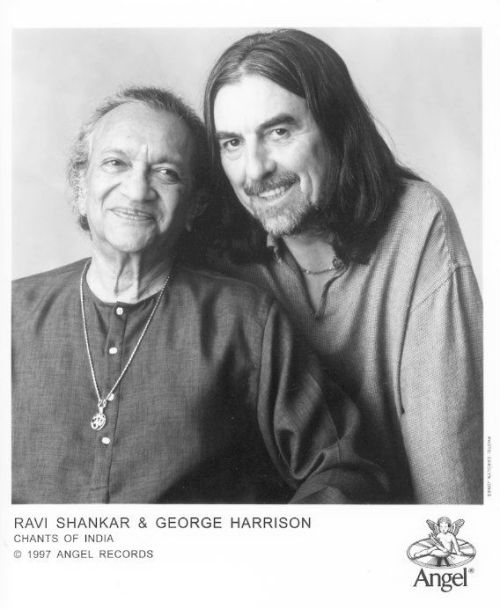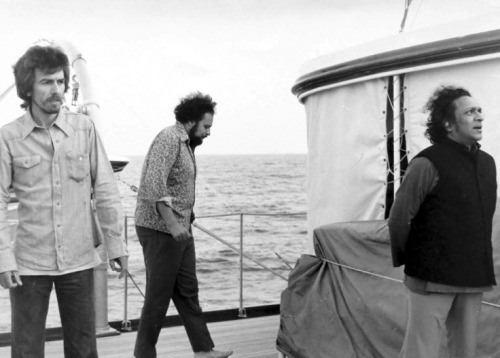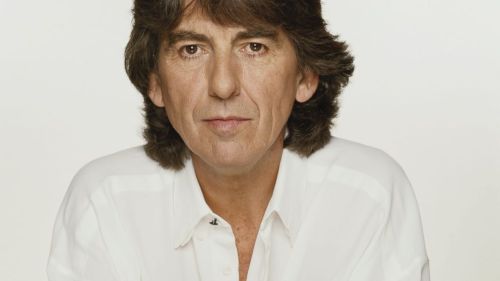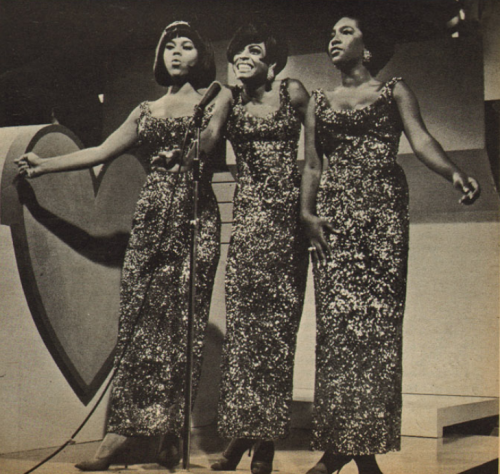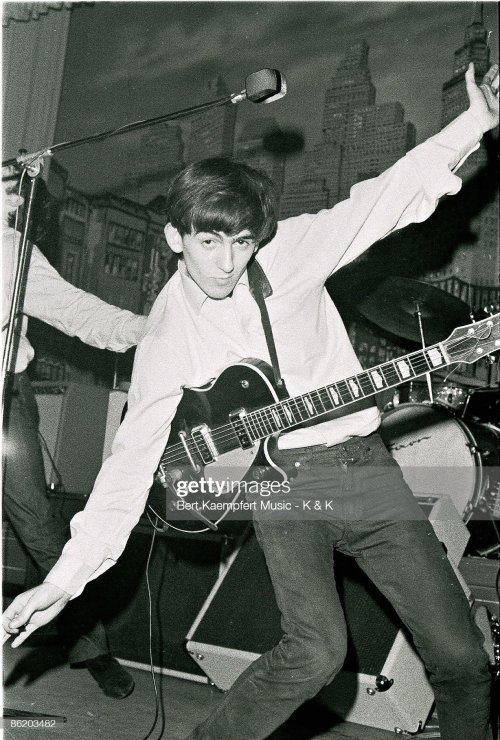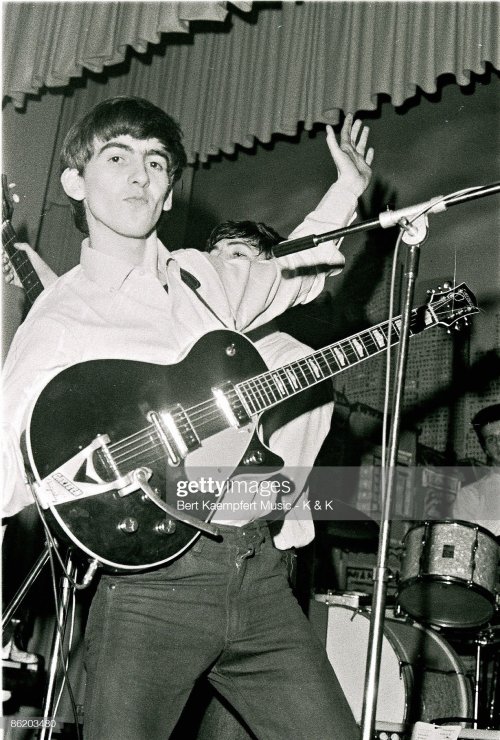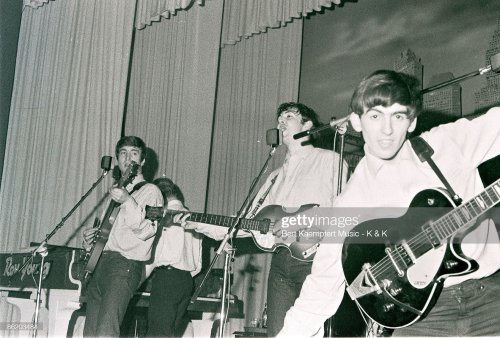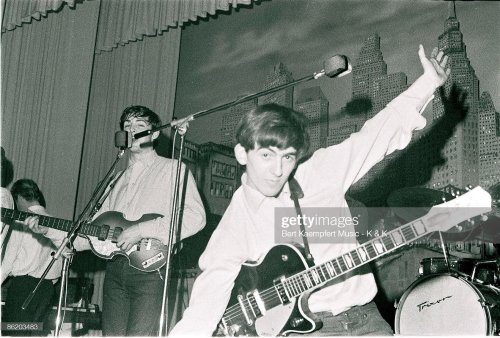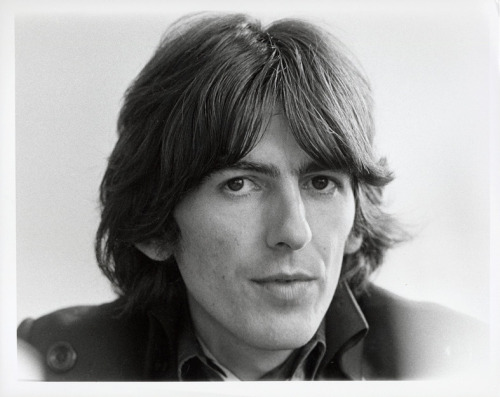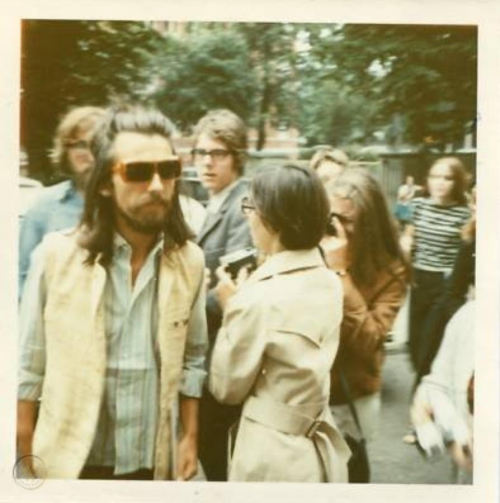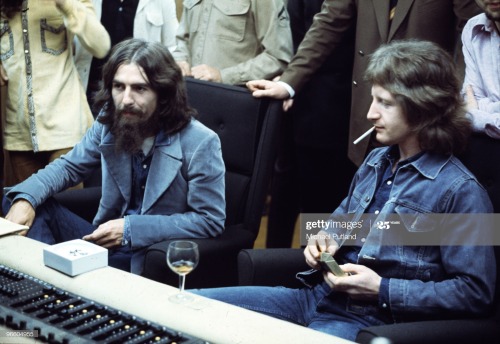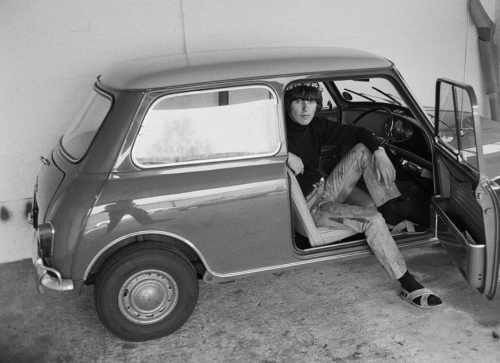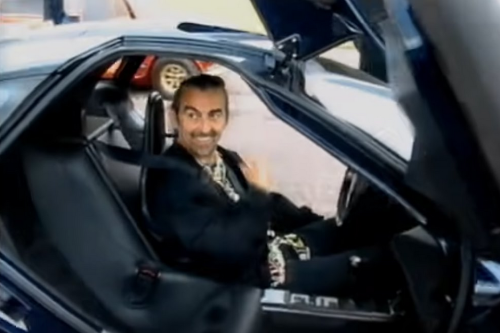#quotes about george
George Harrison, Ringo Starr, and Billy Preston, Bar One, 9 October 1990; photo by The LIFE Picture Collection/Getty Images.
“Nancy and I met George in 1990, at an L.A. dinner party. […] George was perfectly friendly throughout the dinner — in fact, he brought along a tape of the still-unreleased second Traveling Wilburys album, which he eagerly played for all of us on the Donners’ stereo like a proud teen showing off his garage band. I found that sweet. But Nan and I maintained a cordial distance from him, fearful that the word ‘Beatle’ would come out of our mouths in an involuntary, Tourette’s-like outburst.
After dinner, we all retired to the Donners’ screening room, where Dick had arranged for us to view an advance reel of The Hunt for Red October. I ended up sitting right next to George on the couch, with Nancy on my other side. Dick Donner, an outgoing, no-B.S. guy with a thick thatch of white hair, announced, ‘Does anyone mind if I smoke a doobie?’ […] I gently nudged George, who was engrossed in the movie, and offered him the spliff. He looked at it, smiled, and in his best documentary-narrator’s voice said, ‘Ah, the sixties!’ He happily accepted the funny cigarette and took several drags on it […] [and] became totally amped, very gregarious and chatty, talking right over the movie.[…]
‘Guys,’ [Lauren Shuler Donner] whispered, ‘shhhhh!’
George and I both went quiet like reprimanded kids in the fourth grade. After a moment, I turned to him and whispered, ‘Way to go, asshole!’ The two of us burst out laughing, eliciting, now from the entire group, a new round of shushing. […]
Just a few months after his death, I was in Bungalow 8, a New York club that Paul Shaffer had dragged me to, when I noticed a skinny fellow who was the spitting image of George, only young George, coming right toward me. Before I could say anything, this young man embraced me in a tender hug. And then pulled back to explain himself. ‘I’m Dhani Harrison,’ he said. ‘One of the last things my father told me was that if I ever come across people who were important to him, I should give them a hug.’” - Martin Short, I Must Say: My Life As A Humble Comedy Legend(x)
Post link
George Harrison with Mukunda Goswami in Vrindavan, India, 1996. Photo by Prithu Prabhu (?).
“[George] also wrote [songs] to remind himself. People sometimes accused him of preaching (laughs). But you know, he was really preaching to himself. He wasn’t trying to say, ‘You be like this because I’m already like this.’ No, he was always trying to remind himself. And that’s the reason he liked India so much, because he said that, ‘Everywhere you went, there was a reminder.’” - Olivia Harrison, KSHE 95, 26 December 2014 (x)
Post link
George Harrison (aka Carl Harrison for this tour) onstage backing Johnny Gentle at Alloa Town Hall, 20 May 1960. Photo © Johnny Gentle/Gavin Askew.
TheScotland tour, post 2 of 2.
“I remember getting my picture taken with George Harrison. He was very good-looking, they all were I suppose, but George was very cute. He was about the same age as us so that probably helped a bit. But we were just happy to be talking to the band. We asked them what they were called and they said ‘the Silver Beetles.’ It was a real thrill because to us they were proper musicians. There was a a wee bit of flirting, but nothing out of the ordinary.
[…] [The Beatles] were a lot more rock ‘n’ roll sounding than Johnny Gentle, it was more powerful. […] I wasn’t supposed to be at that dance, I told my parents I was going to a friend’s house. But I was found out when I appeared on the front page of the local paper with George Harrison! Actually, they weren’t too bad about it, but I had to clean all the rooms in the house before I could go out the next week.” - Mary Craig, concert attendee, The Beatles In Scotland(x)
Post link
George Harrison in the gardens of Friar Park, 1978. Photo by Mike Salisbury.
“[George] thought that everyone, as a matter of course, should have themselves regularly overwhelmed by nature. He used to say that all unused buildings should be knocked down and gardens put in their place.” - Olivia Harrison, Evening Standard, 12 May 2008 (x)
Post link
Photos by Carinthia West, Terry O’Neill, Tom Pilson/REX/Shutterstock, Susan Flood, Tim P. Whitby/Getty Images for Universal Music Group, David M. Benett/Dave Benett/Getty Images.
Happy birthday to Olivia Harrison!
Q: “What’s the secret to endurance in a relationship?”
Olivia Harrison: “I think in life, first of all, you have to have — respect is really important, but also I think you have to know where you’re going in your own soul and in your own life, and in your own — who you are; who do you want to be in life? And you need a partner to help you be that best person you can be. And sometimes you’re not that best person, but I think that’s the goal. I think when you have a goal like that? You know, George always wanted to be… a light-hearted person, and he was a very intense person, and I think you need a higher goal to stay together. I think that’s the real reason. Because then your own problems don’t seem like such big deals.” […]
Q: “So how are we supposed to find which is our path?”
OH: “Oh, that’s a good question. Especially now in this day and age, when everything is a big diversion. I think nature — I think the answer is in nature, I think the answer is in silence, and not being afraid of nothingness, not being afraid of the abyss, the void, the silence. I think that’s where man can be saved from where we are now. I really do. I think you need to go sit somewhere in silence and be overwhelmed by nature. That seems to be a way to reset our lives.” - Cultura Pop, 19 October 2017 (x)
Post link
George Harrison wearing a “Stamp Out The Beatles” sweatshirt (and a “Yellow Submarine For Peace” badge from New York’s Workshop In Non-Violence) during a recording session on 17 May 1967. Photos by Leslie Bryce for The Beatles Book monthly.
“Just to show how little he minds the knockers who are trying to push the Beatles down these days, George actually wore a ‘Stamp Out the Beatles’ jersey to recent recording sessions. We thought that he might not want us to photograph him in it; but he was only too happy for us to take the pic […], and seemed to be treating the whole thing as a huge joke.” - The Beatles Book, July 1967 (x)
Post link
George Harrison at a press conference launching Derek Taylor’s book “Fifty Years Adrift” in Sydney, Australia, November 1984. Photo by Peter Carrette Archive/Getty Images.
“George, oh George. He was one of the nicest and most certainly one of the funniest people I have met in this business. He had his moments, we all do, but to portray him as sour or negative or untalented as some have is so far from anything that I ever saw during my time with him, both with The Beatles and afterwards. The other Beatles were funny, but I have to say that he most certainly was the funniest.
[…] But, of course, George was also Mr. Nice Guy. There was a couple getting married who he had met somewhere along the way. They weren’t famous or even in the music business, just an ordinary couple that George, the most ordinary superstar you’d ever hope to meet, happened to cross paths with. One evening he asked me to record a special message that he made for them, along with him playing them a song. We put it on a cassette and sent it to them so they could play it at their wedding. Who wouldn’t love George?” - Ken Scott, Abbey Road To Ziggy Stardust(2012)“Working with George [Harrison] was always a joy.” - Ken Scott, Premier Guitar, 19 March 2010
“[George] was so much more than The Beatles. As a guitarist he eventually got his own unique sound when you could always tell it was him. There are very few guitarists that can say that.” - Ken Scott, Finding Zoso, 4 December 2012 (x)
Post link
George Harrison and Richie Havens, 1969; photographer unnamed, photo © akg images.
“I thought ‘Here Comes The Sun’ was the happiest, simplest, clearest wishing well for the world of all the songs that they [The Beatles] had ever done. It is a message for all of us. The sun is going to come up tomorrow, no matter what. You’ve got to be prepared, it’s going to be all right. Things are not as hard as you’re making it. That was the message of the time that needed to be heard. I said that to George and he said, ‘It is a song about finding the light, the real light, the sun.’” - Richie Havens, British Beatles Fan Club, 2011 (x)
Post link
Mark McEwen with George Harrison and Ravi Shankar, May 1997; photos courtesy of iammarkmcewen.blogspot.com, and © Mark McEwen.
“We discussed Ravi’s music, his new album [Chants Of India], why George thought it was so important, and then came the moment when I brought up the subject I wasn’t supposed to bring up. ‘You were in the Beatles, the biggest band in the world,’ I said. 'You met kings and queens and talked to movie stars and captains of industry. What was it about this man that made you stop?’ George’s eyes twinkled as he answered. 'We’d met everybody and hung out with everyone and all kinds of people told us we were this and we were that. Truth was, I was tired of all of it and then this little man (and there he turned and smiled at Ravi) came into my life and made it worthwhile again.’ He talked about how Ravi knew very little of who the Beatles were. George talked about how special and unique Ravi was. He talked of how Ravi taught him to see the world in a totally different way. And more.” - Mark McEwen, iammarkmcewen.blogspot.com, 23 August 2015 (x)
Post link
Clip from The Southbank Show, 1997.
“[After a final mixing of a track for Chants of India one] evening [George] came and embraced me with tears in his eyes and simply said, ‘Thank you, Ravi, for this music.’ His emotion meant so much to me, and my eyes filled with tears too.” - Ravi Shankar, Raga Mala(1997)
“I like producing Ravi’s music, because for me it’s educational as well as a joy to work with. It’s actually soothing to your soul, and it helps you to focus or transcend.” - George Harrison, Raga Mala(1997)
“It’s something that I believe in, and I think it’s a benefit if people, during the day, you know, everybody gets stressed out, and this music is particularly inclined to calm you down. It’s an antidote to stress.” - George Harrison, CBS This Morning, 12 June 1997
Ravi Shankar: “He is like a son to me, I mean [laughs].”
George Harrison: “Sometimes I feel like his dad as well, though. [laughs] He can be… Well, you see, with my past, with The Beatles and stuff, we were thrust heavily into the music business, whereas Ravi was, you know, doing his performances in the classical context. And so in some respects, I’ve been able to try to help him or protect him from a vicious world, you know, in terms of contracts or different things like that. In that respect I feel almost like — you know, I have a kind of guardian type of attitude toward him. But most of the time I just feel like friends, and, you know, we just feel like kids really. It’s just our bodies that are old. Inside we’re, like, six years old.” - The Southbank Show, 1997 (x)
Hariprasad Chaurasia, George Harrison, and Shivkumar Sharma, 1973; photographer unnamed, photo courtesy of hariprasadchaurasia dot com.
Rest in peace, Shivkumar Sharma. Sincere condolences to his family and friends.
“George used to always say that if ever you are not feeling right, you should listen to Bob Dylan’s ‘Last Thoughts on Woody Guthrie’ and [Hariprasad Chaurasia, Shivkumar Sharma and Brij Bhushan Kabra’s] ‘Call of the Valley.’” - Olivia Harrison, The Hollywood Reporter, 22 October 2011
“‘Bhoop Ghara’ from Call of the Valley, recorded in 1967 by Shivkumar Sharma, Hariprasad Chaurasia and slide guitar player Brijbhusan Kabra, [Olivia recalls] was ‘something George had on our juke box. We played it as a remedy in our home if you were feeling a certain way. Kabra was one of George’s heroes as a slide guitarist, up there with Ry Cooder.’” - Songlines, 2018 (x)
Post link
Ravi Shankar and George Harrison, 1966; photo courtesy of Indian Express.
“‘You revered Ravi,’ [Olivia Harrison] says of the great man. ‘He carried with him that great tradition, but he was also a very modern man and had a great sense of humor.’
Partly recorded in India and partly at Harrison’s Friar Park home in Henley-on-Thames, Olivia recalls the recording sessions [for Chants of India] well. ‘Ravi was very specific about the mantras and how they were recorded and orchestrated and George really wanted people to understand the vibrations of those chants was beneficial to their well-being.’
The track on her [Songlines] playlist is a particularly poignant choice. ‘At the end of his life George said to me that all he could listen to was “Sarve Shaam,”’ Olivia remembers. ‘After all the sounds and sights and tastes you experience over a lifetime, it came down to the purity of “Sarve Shaam.”’ The piece was also performed as the opening blessing at the Concert for George memorial, held at London’s Albert Hall in 2002.” - Songlines, June 2018 (x)
Post link
George Harrison and Ravi Shankar, 1974. Photo: Picture-Alliance/Photoshot/dpa.
“‘Mangalam’ came to me while I was walking in Friar Park, George’s place, where we were recording. I was looking at the trees and the sky, and feeling very elated all of a sudden, wishing everything should be good for everyone, and it just came to me.” - Ravi Shankar, Rolling Stone, 15 May 1997
“Steve Murphy, the president of Angel Records, had heard some songs that were similar to material on ‘In Celebration,’ a Ravi retrospective that I had helped assemble last year. He suggested we go in to the studio to record more. This music, which is based on ancient Vedic chanting, I very much enjoy. And, of course, it gave me an opportunity to work with Ravi, so it made perfect sense. […]
In a way it represents the accumulation of our ideas and experiences throughout our 30-year relationship. But to put it into a slightly more commercial aspect, the record label asked us to do this and that would never have happened 15 years ago. Because of the fact of multiculturalism has become more accepted, and more people are interested in what this music offers, this project has become more commercially viable. And this music is very close to me, this is something I very much wanted to do. I actively read the Vedic scriptures and I’m happy to spread the word about what this project is all about. People also need an alternative to all the clatter in their lives, and this music provides that. Whether it’s Benedictine Monks chanting or ancient Vedic chants, people are searching for something to cut through all the clatter and ease stress.” - George Harrison, HITS, 1997 (x)
Post link
Photo by Carolyn Jones.
Q: “What did you learn musically from [George] Harrison?”
Anoushka Shankar: “Patience. We worked with a choir on Chants of India. But the recordings were difficult. The choir didn’t sing the way we had imagined it. I was totally irritated and ranted and raved that the entire choir should be kicked out and that everything had to be approached differently. George stayed calm. He simply adjusted his music to the choir and everything worked out. George took me aside later on and told me the story about the optimistic frog and the pessimistic frog. Both fell into a bucket of milk. The pessimistic frog drowned because he gave up immediately. The optimistic frog pedaled until he had turned the milk into butter and was saved. That impressed me.” - translated from ZEIT, 5 April 2016“George Harrison, whom I was very close to, told me a story when I was fifteen. It was about two frogs. He said they both fell into a pot of milk, and one of the frogs, a pessimist, gave up straight away and drowned. The other frog kept trying to jump out, even though he failed again and again. He tried for so long that eventually all his jumping and swimming churned the milk to butter, and he was able to jump neatly away. I don’t always believe there’s going to be a happy ending to every event in my life. However, I act as if there might be, as without that shred of hope I wouldn’t keep on trying, and a sad ending would therefore become a self-fulfilling prophecy.” - Anoushka Shankar (on the best piece of advice she ever received), Man’s World India, 8 December 2016 (x)
Post link
Ravi Shankar and George Harrison, India, 1974; photo by Michael Ochs Archives/Getty Images.
Q: “So the relationship has had a powerful impact upon both your lives?”
George Harrison: “In one way, it’s kind of given me a life. Because if you don’t know who you are and where you’ve come from and where you’re going, really, what is life? You can have all the money in the world and all the glory. But if you don’t know what is the point, then your life is empty. So, in that respect, Ravi — not just Ravi, but he was the main ingredient — patched me into the Vedic tradition. And from that I’ve learned all these things about yoga, about meditation, about what it is, about what are we doing here, about what is the goal. I’ve come to understand incredible stuff, just through pursuing that. Without it, I’d just be a boring old fart.”
Ravi Shankar: “To me, George is, I don’t know how to describe it, a son, a friend, someone very dear, and I love him very much. He has given me so much love and respect that my heart is full of it.” - Los Angeles Times, 10 May 1997 (x)
Post link
George Harrison with Dark Horse Records band Stairsteps, comprised of Keni Burke, James Burke, Clarence Burke Jr. and Dennis Burke; photographer unnamed, published in Cashbox, 1975.
“[Stairsteps] recently had a smash for their new label Dark Horse with ‘From Us To You.’ Oddly enough the brothers were always into the Beatles and when they first met George Harrison it was like a dream come true.” - Cashbox, 29 May 1976
“It was while working with Billy Preston with Preston’s ranch that Keni was introduced to George Harrison, who, after listening to a tape of the funky instrumental ‘From Me To You,’ decided to sign Keni to his Dark Horse label.” - Cashbox, 24 September 1977
“Basically, the people who join Dark Horse [Records] are important to me. Maybe, in some ways, a little more than music, because I wouldn’t like to get involved with somebody who just happened to be a fantastic singer or something, but who I personally didn’t like. Some record companies have a bunch of artists whom they don’t really like as people — then it creates all this bad feeling, but I must have a decent and friendly relationship with the artist.” - George Harrison, Melody Maker, 6 September 1975 (x)
Post link
George Harrison, 1987; photo by Aaron Rapoport/Corbis via Getty Images.
“Really sweet guy. He had those eyes. I only saw them one other time; Dylan had those eyes. They can look right through you, right into your soul. I never thought I’d see them again but Harrison had them.” - Al Kooper, Lancaster Online, 2009
“George looked me deep in the eyes, as only George could do. He had this great sort of mystic look that he could put on that pierced you completely.” - Gordon Murray, Living In The Material World bonus features
“He had this way of looking at you that made you feel you were without limitations. It just went straight to your heart. Once you’d been with him, he had this way of making you want to bring out a truer version of yourself, unlocking something. It was profound and electrifying, and it can still bring prickles to the back of my neck.” - Olivia Harrison, Huffington Post, 2014 (x)
Post link
Derek Taylor and George Harrison in Derek’s office at Apple, 1969, photo via Tracks UK.
“[Derek Taylor] taught me to just be myself… which I always tried to be.” - George Harrison, interview conducted by Larry Kane in the mid-60s, quoted in When They Were Boys
“Just remember, he [George] has enormous intellectual curiosity; he wants to know everything. […] George may be the youngest Beatle and all that, but he is beyond his years in his values, and in his pursuit of the truth, and I might add quite candidly, his ability to [be] direct and sometimes painfully honest.” - Derek Taylor, interview conducted by Larry Kane, quoted in When They Were Boys
“I always wanted to do something on my own, but it was easier said than done. Derek [Taylor] had more faith in me than I did. He, Joan and the kids often visited us at Friar Park where we got merry together; I liked to show him how I made my garden grow. He was always telling me I could make it on my own if I wanted to.” - George Harrison, as told to Ivor Davies in 1997, quoted in The Beatles And Me On Tour(x)
Post link
Ravi Shankar and George Harrison, 1997; photo by Carolyn Jones, © 1997 Angel Records.
Q: “This new recording is the latest product of a relationship that stretches back more than 30 years. Do you remember what it was like in the beginning?”
George Harrison: “It’s almost as though it was scripted, and all I did was follow the script. When I first got a recording of Ravi’s, a World Pacific recording, I put it on, I played it, and inside of me I had an instinctive feeling that I was going to meet him, which I did. And all the other things have been a byproduct of that relationship. I went to India to learn some music with Ravi, but my main quest was that I wanted to know about the yogis. But Ravi was like my input into it. Through him I was able to hear the best music, buy the best incense, read the best swamis, meet the best people. I was very, very fortunate to become friends with him. And consequently all the goodness that I feel has come to me in my life is a direct effect of being plugged into that Indian-ness or Indian tradition or whatever that I gained through Ravi.”
Ravi Shankar: “In the beginning, when we met back in 1966, I found him very immature, naturally, because he was very young then. But still he had tremendous passion in wanting to know about India, Indian yogis, Indian music, Indian philosophy, Indian food and all that. And through the years, I thought, you know, this too shall pass. But I introduced him to this book, ‘Autobiography of a Yogi’ by Paramahansa Yogananda, and that put him on a serious approach. Then he tried himself with Maharishi Mahesh Yogi and the Krishna people, but he always came back to me through music. In fact, it is mainly through music that I pushed him further and further, and today I find him to be so much into it, more than ever before — not in a superficial manner, but deeply into it.” - Los Angeles, 10 May 1997 (x)
Post link
Ronu Majumdar and George Harrison during the recording of Chants of India, 1996; photo courtesy of Express Newsline, 1996.
“I find him a great human being who came to this planet — see I am getting goose hair already — I think he came to this planet to spread the message of love, message of humanity, and message of how you can be a very humble person after reaching heights of skies. […]
To my personal life, to my soul, he was like a little brother, not a star, not a big name, someone who I could connect to, someone I met as a great human being or as a saint, as the humblest person possible, someone I can’t even imagine that I met.” - Ronu Majumdar, BBC Radio 4 Extra, November 2018 (x)
Post link
“Raga” director Howard Worth with George Harrison and Ravi Shankar, off the coast of Cannes, May 1972. Phots: Ventura County Star.
“You know, though, the film [Raga] very nearly never made it. We had to stop production for 9 months because we ran out. The only reason RAGA finally became a reality is due to only one person — George Harrison. There was a time when most of the film was completed and I was in terrible financial straits. I couldn’t really complete the film and I didn’t know where to turn. I was calling up all the distributors and screening, and they were all telling me, It’s a great film but it’s different and what are we going to do with it?’ Now, George Harrison is in the film, briefly, and we had just that relationship — doing the film. He did his piece and that was it. But out of desperation I called him to see if he could pull any weight with the distributors. He came over and saw the film, and then he just got up and walked out. I figured it was all over, but he called the next morning and said, ‘What do you need?’ I said, ‘I need distribution.’ And he said, ‘You need money to finish it. The film really moved me; that’s why I left. What you’re trying to say is what matters.’" - Howard Worth, interview conducted by Stephen T. Smith, Filmmakers Newsletter Summer 1972: Vol 5 Issue 9-10
“In 1968, I did a documentary film with Ravi Shankar called ‘Raga,’ and in that film, Ravi said, ‘Music is the only language I really understand, for I believe in Nada Brahma, meaning The sound is God.’ All music, whether it’s deep within the cosmos, or it becomes more gross in the physical world, is still based on the subtlest manifestations of God. I feel like Ravi does about music, and I want to see that sound.” - George Harrison, Billboard, 5 December 1992 (x)
Post link
George Harrison; photo by Terry O'Neill.
“A waitress came over, and George ordered tea, explaining that he was already highly intoxicated (knowing Bob [Longhi], undoubtedly extremely potent ganja), and could not handle an alcoholic drink. […] When I expressed great admiration for his own playing, [Harrison] confessed with graceful modesty that he had ‘no idea’ what he does while playing the guitar. […]
Harrison peppered our conversation with humorous observations and jokes, providing a refreshing diversion from the esoteric musical and philosophical subjects we focused on. Together with his immersion into Hindu philosophy, he was clearly a street-wise person who had been catapulted into the upper echelons of world society.
At one point, Harrison mischievously teased me about my preference for computer instruments with his famous accent, asking if one gets as horny with computer music as you do playing rock and roll. My music absolutely has a sensual dimension, but I knew he was joking, and laughed out loud.
[…] Harrison apologized several times during our extended conversation for being overly intoxicated, but he seemed fine and completely lucid to me. I was surprised by how animated and talkative he was because I had imagined he would be shy and reserved.” - Michael Robinson on chatting with George Harrison at Bob Longhi’s restaurant in Hawaii, January 1990, Azure Miles Records, 2001 (x)“From across the restaurant [Harrison] appeared youthful, tall and thin, and his stride was unusually smooth, almost seeming to glide across the floor. Now he was sitting across the table, and I was struck by hundreds of little lines on his face, suggesting an extraordinary map of experience. […] Saturday evening in January 1990, and my girlfriend and I decided to have dinner in Lahaina [Maui]. […] During all this, we were joined by two friends, one of who had spent time with George and his wife [Olivia] in Hana. Knowing my reverence for the Beatles, she asked if I would like to meet Harrison. I wanted to, of course, but there were no empty seats at George’s table, and I didn’t want to walk up like some annoying autograph seeker, not to mention that I was somewhat intimidated. So we sat there stealing glances, and after a few drinks, my inhibitions were subdued. When I noticed one of the men leaving George’s table, the friend who knew him said, “Let’s go!” and I found myself following her in a dream-like state. […] Harrison peppered our conversation with humorous observations and jokes, providing a refreshing diversion from the esoteric musical and philosophical subjects we focused on. Together with his immersion into Hindu philosophy, he was clearly a street-wise person who had been catapulted into the upper echelons of world society. At one point, Harrison mischievously teased me about my preference for computer instruments with his famous accent: ‘But can you get horny playing a computer?’ indicating that this was one of the joys of playing rock guitar.“ […] One regret I have from that evening is how I failed to respond when George asked me if I wanted to go walking down Front Street with him to ‘Look at the T-shirt shops!’ stated with the enthusiam of a young boy. Somehow I couldn’t believe I was really hearing this invitation, and I also wrongfully thought that Bob would not approve of me wandering off with his friend who didn’t visit Lahaina very often. So the opportunity passed, and we continued our conversation.” - Michael Robinson, An Evening With George Harrison, 2002, azuremilesrecords dot com (x)
Post link
Photos by Curt Gunther, Chuck Boyd for BEAT.
“[When The Supremes arrived at a NYC hotel to meet The Beatles, they found the band] playing with toys, giggling inexplicably, and behaving in an excessively silly manner. Flo [Florence Ballard] was surprised to see that the four superstars ‘had little cars they would wind up and scoot across the floor. We had time to talk, but they were too busy playing with their cars. When I saw them doing that, I looked and said, “They’re kind of strange.”’
The meeting was marred by an awkward silence most of the time. One of the Beatles would ask the women a question, they would answer, and the silence would descend again. Then someone would tell a joke, and everyone would giggle nervously. […] Since the Beatles were obviously eager to get back to other things, the Supremes left quickly, with the excuse that they had to rush back to the Copa for their second show.
But Flo rose above the incident and saw the bright side even when, in the view of others, a mini-fiasco occurred. ‘They’re some hell of writers,’ she said years later. ‘All the tunes they made I was crazy about. They have a lot of meaning to me.’” - The Lost Supreme: The Life Of Dreamgirl Florence Ballard(2008)“Which Beatle do they like best? Diana: ‘All four. I love them as a group sound.’ Mary: ‘Me, ditto.’ Florence: ‘George. He’s so dreamy looking.’” - New Musical Express, 3 June 1967
“I think they were waiting for the Ronettes or something. That meeting with The Beatles was kind of odd. But as I said, later on George and I became very dear friends; in fact, I bought a limo from him.” - Mary Wilson, Rock Cellar Magazine, 14 August 2017 (x)
Post link
George Harrison, Paul McCartney, John Lennon, Pete Best, and Roy Young on stage at The Star-Club in Hamburg, (May?) 1962; photos by Doris Kaempfert (?), © K & K Ulf Kruger OHG/Redferns, Bert Kaempfert Music - K & K/Redferns via Getty Images.
“When The Beatles’ manager, Brian Epstein, secured a recording contract with EMI in 1962, he sent a telegram to the band in Hamburg, Germany: ‘Congratulations boys. EMI request recording session. Please rehearse new material.’ The Beatles replied to the telegram with postcards. Paul McCartney wrote, ‘Please wire GBP 10,000 advance royalties.’ John Lennon scribbled, ‘When are we going to be millionaires?’ But George Harrison made the following request: ‘Please order four new guitars.’ While his band mates visualized piles of money, Harrison could think only about guitars.” - Andy Babiuk, Harrison by the editors of Rolling Stone (2002) (x)
Post link
Jimi Hendrix and George Harrison, both photos by Barrie Wentzell.
“A camp bed was also kept handy for the numerous musicians wishing to sleep over at Jimi Hendrix and Kathy [Etchingham]’s place [on London’s Brook Street] - George Harrison was one such guest.” - View From The Mirror: A Cabbie’s London, 6 September 2014
“[A]s journalist Rip Rense recounts, there was always a suspicion that George [Harrison] could have played hot licks that way if he wanted: ‘Eric Clapton tells a story about seeing Harrison smiling in the wings at a concert once, and realizing that George could have played anything he or [Jimi] Hendrix did, if he wanted to […].’” - While My Guitar Gently Weeps: The Music of George Harrison
“Between my dad, John, Paul and Ringo, there was pretty much no musical stone they left unturned. I remember saying to my dad: ‘The backwards solo guitar on that Hendrix thing is just the stickest thing I ever heard.’ Dad just replied, without looking up from his tea: 'I did the first backwards guitar solo on “I’m only sleeping”.’” - Dhani Harrison, Evening Standard Magazine, June 2006 (x)
Post link
George Harrison (and, in photo 2, Mal Evans) in fan photos from 1969.
“What annoys us is that people treat us [The Beatles] sometimes as if we are just things and not human beings.” - George Harrison, Rave, June 1964
“George Harrison is the reluctant Beatle. He did not expect fame. When it came, he was bewildered.” - Melody Maker, 7 November 1964
George Harrison: “[The fans have] all got this idea that we’re something else.”
Leslie S. (fan): “Good or bad?”
GH: “I don’t know… whatever it is, they don’t see us as what we are, which is people.” - conversation with a fan taped at Kinfauns, 1967Q: “How did taking LSD affect you?”
George Harrison: “It was like opening the door, really, and before, you didn’t even know there was a door there. It just opened up this whole other consciousness […].”
Q: “Did it make you feel that your life could be very different from what it was?”
GH: “Yeah, but that presented a problem as well, because then the feeling began in me of, well, it’s all well and good being popular and being in demand but, you know, it’s ridiculous, really. I think from then on I didn’t enjoy fame. That’s when the novelty disappeared, around 1966, and then it became hard work. […] I mean, [LSD] has a humbling power, that stuff. And the ego — to be able to deal with these people thinking you were some wonderful thing — it was difficult to come to terms with. I was feeling, you know, like nothing.” - Rolling Stone, 5 November 1987 (x)
Post link
George Harrison and Pete Ham in the studio control room, September 1971; photo by Michael Putland/Getty Images.
“Pete just loved working with George. He felt he learned a lot from him. […] George Harrison told Pete he wanted to perform an acoustic duet of ‘Here Comes The Sun’ [at the Concert for Bangladesh]. […] ‘Pete was thrilled that someone he admired thought enough of him to do that stage spot at the Bangla Desh concert. It was really a buzz for him.” - Beverley (Pete’s widow), Without You: The Tragic Story of Badfinger
“We all came through so much in the Sixties and we all wanted so much to create something positive, something good. And it’s hard to… You know, when we come out into the Seventies, and we find it’s hard to go on. A lot of these people were only part-time hippies, or part-time lovers. They, you know, the badness of the world, or in them, caught up to them too soon. And you find that they turned round and all just started stabbing each other in the back. It’s like, we all need to support each other in many ways in order to exist. Like for example, just the other day I heard that [Pete Ham] from Badfinger — you know, Badfinger, who was on Apple Records, ‘Day After Day’ — the guy who wrote the big Harry Nilsson tune ‘Without You.’ He hanged himself. Okay, so, he’s hanged himself because he… can’t go on, you know… can’t go on.” - George Harrison, radio interview, August 1975
Q: “Who are the bands you’re most proud of from the Apple stable?”
George Harrison: “Anybody who had a hit, probably… like Badfinger was pretty good. It was a very sad story, though, because the guy, he ended up killing himself. Pete Ham, who was a lovely fellow, he was a good guitar player and a great singer. He wrote… the most famous tune I would imagine is ‘Without You,’ you know, the Harry Nilsson record.” - Undercover, 1996“[George spoke of Pete] with fondness as a friend and with respect for his beautiful songs. I have had the pleasure of meeting Pete’s family and, although I did not know Pete himself, his lyrics and recordings embody a gentle spirit and tender heart.” - Olivia Harrison, BBC, 27 April 2013 (x)
Post link
George Harrison in the garage at Kinfauns, 1965; photo by Henry Grossman.
“One side of George was an amazingly soulful, peaceful man seeking karma and all that; the next minute he’d want to get behind the wheel of the most powerful vehicle in the country, driving at 193 miles-an-hour.” - Michael Palin, Concert for George microsite
“[George] consumed information fantastically well. Of course, he was very creative, and his thinking processes were fantastic, he was kind of otherworldly but also quite down to earth at the same time, simply a very unique person. […] [H]e really understood racing and he met all the interesting people that he wanted to be around. He was very friendly with Jody Scheckter, Emerson Fittipaldi, and many others. We had a very special relationship, and when I was on the road as much as I was in those days, Helen, Paul, and Mark [Stewart’s wife and sons] would go to Friar Park and spent a lot of time with George and his family. […] George would ask me about the drivers I raced against and even before that, who I was competing against too. He definitely revered Stirling and Fangio, those two in particular I would say.” - Jackie Stewart, The Race, 28 November 2021
“Most musicians want to be athletic stars of some sort. My fantasy is to be a race-car driver.” - George Harrison, Rolling Stone, 12 May 1983 (x)
Post link
Image from the “Any Road” music video (available to watch on the official George YouTube channel).
Q: “You are a keen driver and own two cars close to being racing models, don’t you? They must give you a lot of pleasure.”
George Harrison: “My McLaren F1 road car always gives me an awesome feeling when I am in it. Next favorite is my Rocket (for hooligans only). Respects to Gordon Murray (designer of both the McLaren F1 and the Rocket, and the BT46B, and now head of car design at McLaren International). Bit of a contrast to my first cars, a Ford Anglia and a Jaguar MkII.” - The Times F1 Handbook, March 2001“[George] had such fun building the McLaren. When we did the McLaren F1, we decided, I decided that it would be the most personalized motorcar ever made. And if you wanted to customize the car, way beyond paint colors and stuff, if you wanted special bits and pieces, we encouraged people to come down [to the factory]. And George got that concept, and he got it big time. And he used to [laughs] — he almost lived there. We actually joked about getting him a bedroom in the factory, because he used to be down there every week. And I think, I think the car ended up with Ganesh — you know, the Indian little elephant thing [ed. note: Hindu God Ganesh] — I think the car ended up with fourteen elephants in it. […] He really went for it on the customization. So that makes it a very special motorcar. And it was great fun doing it. In fact, the guys building the car so loved him coming round that they made him a special book with all the photographs of it, his car being built, and signed it, and they gave it to him at the end.” - Gordon Murray, Living In The Material World bonus features (x)
Post link

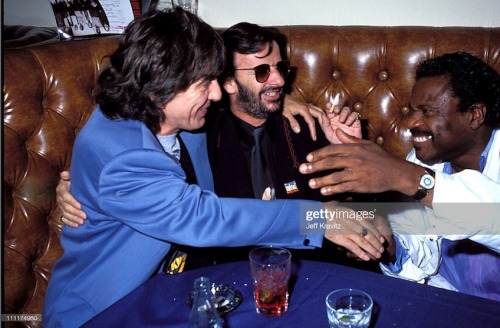
![George Harrison with Mukunda Goswami in Vrindavan, India, 1996. Photo by Prithu Prabhu (?).“[George] George Harrison with Mukunda Goswami in Vrindavan, India, 1996. Photo by Prithu Prabhu (?).“[George]](https://64.media.tumblr.com/7c6d46bfea7729437f304209fc6a91bb/d358e80bff222fe8-f9/s500x750/a4d3c82e9a6e61588121f2e36b3a14771433de20.png)
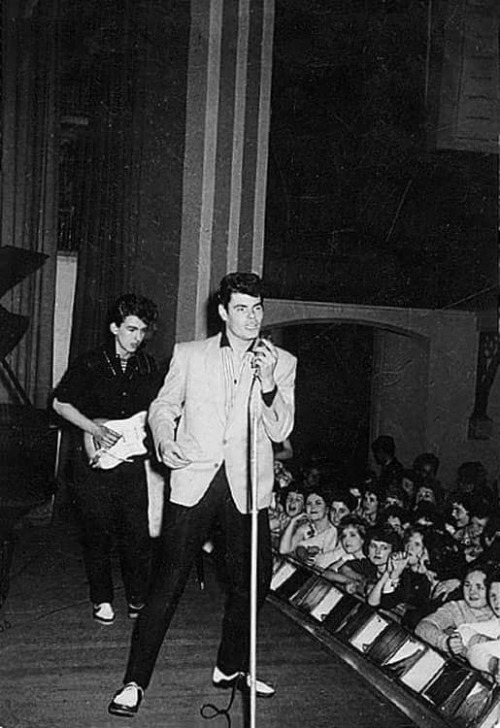
![George Harrison in the gardens of Friar Park, 1978. Photo by Mike Salisbury.“[George] thought that e George Harrison in the gardens of Friar Park, 1978. Photo by Mike Salisbury.“[George] thought that e](https://64.media.tumblr.com/e1b111de2abe993e84e38d6b8f567c35/987c0827a7156c58-c4/s500x750/d6e49bb81b45836e8820a8d5a83b8af644b46ab5.png)
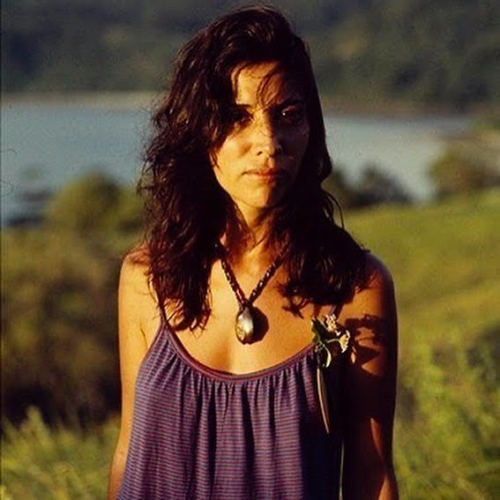

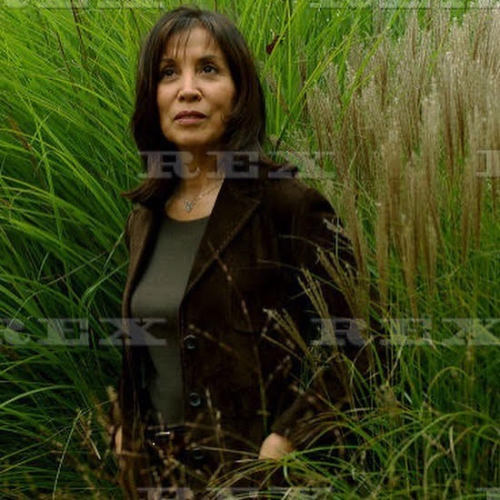


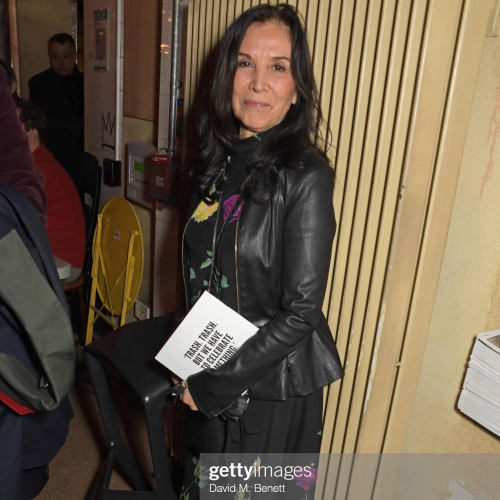


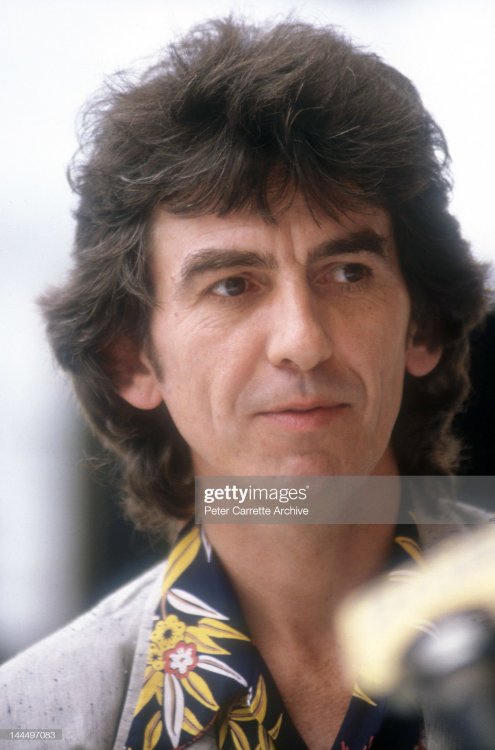
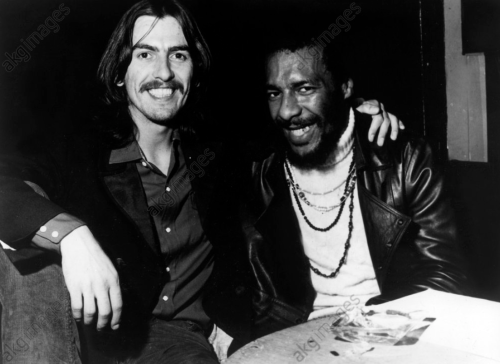
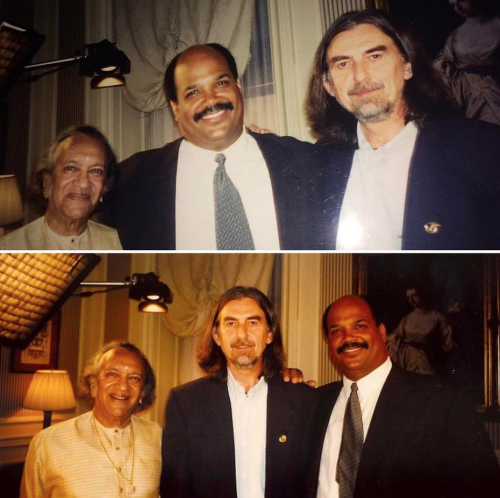


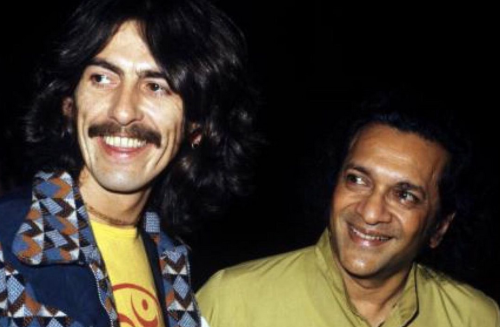
![Photo by Carolyn Jones.Q: “What did you learn musically from [George] Harrison?” Anoushka Shankar: “ Photo by Carolyn Jones.Q: “What did you learn musically from [George] Harrison?” Anoushka Shankar: “](https://64.media.tumblr.com/eeebd5a0efb74241536aa1dd3d8ecce2/8f64d83da21787db-a6/s500x750/4f9f7c6fd8337edcb8d78a2fb1da07cd7fdc505f.jpg)
